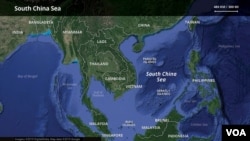Upbeat talks this month between China and the Philippines after a maritime flare-up should improve a relationship that is considered pivotal to the broader, stickier South China Sea sovereignty dispute, analysts believe.
On May 21, the two nations held their sixth Bilateral Consultation Mechanism on the South China Sea, a waterway over which both dispute sovereignty. Philippine President Rodrigo Duterte and his Chinese counterpart, Xi Jinping, created the process in 2016 to manage differences.
Officials in Manila loudly protested in March and April the mooring of 220 Chinese fishing vessels at Whitsun Reef, a contested feature in the South China Sea’s Spratly Islands.
“The two sides had friendly and candid exchanges on the general situation and specific issues of concern in the South China Sea,” the Philippine Department of Foreign Affairs said on its website after the May 21 talks. “Both sides acknowledged the importance of addressing differences in an atmosphere of openness and cordiality to pave the way for practical cooperation and initiatives.”
The Chinese Foreign Affairs Ministry said the dialogue process promotes “healthy and stable development of China-Philippines relations” and maintains “peace and stability” in the South China Sea, state-run media outlet China.org.cn reported.
Friction between China and the Philippines gives the United States more influence in the maritime sovereignty dispute, experts have told VOA in the past.
Manila has longstanding, close military ties with Washington, which sees the Philippines as one in a string of Western Pacific allies. China as Asia’s top superpower and a former Cold War foe of the United States resents U.S. influence in the sea.
Brunei, Malaysia, Taiwan and Vietnam also dispute much of the 3.5 million-square-kilometer waterway that’s prized for fisheries and energy reserves.
The United States sent warships to the sea 10 times each in 2019 and 2020, moves widely seen as warnings against further Chinese military expansion.
Revisiting a friendship
The Sino-Philippine talks show that both sides are learning to “dance” after the Whitsun Reef flap instead of using “megaphone” diplomacy, said Eduardo Araral, associate professor at the National University of Singapore's public policy school.
Chinese leaders hope to take the South China Sea off the agenda in the Philippines before next year’s presidential election there, Araral said. Duterte cannot run for reelection because of term limits, but his popularity could influence votes for other candidates.
“It is in China’s interest to give Duterte some wins such that he won’t be blamed for what happened in China and his opponents will not have any more leverage than they need,” he said.
Duterte sought a friendship with China after he took office in 2016. Filipinos more used to a stronger relationship with the U.S. have questioned Duterte’s tilt toward China in the context of incidents such as the Whitsun Reef flap.
China to wait, watch
China could cut off investment projects to the relatively poor Southeast Asian country or stop Filipino fishing boats and offshore oil exploration if the Philippines gets on its bad side, said Enrico Cau, Southeast Asia specialist with the Taiwan Strategy Research Association.
“They are trying to position themselves in such a position that they are equidistant [from the United States and China],” Cau said. “Of course, China is a very important trade partner. Irking China on those islands is bound to create backlashes for Duterte.”
China will keep a low profile among Filipinos ahead of the 2022 election, but not change its course at sea, forecast Maria Ela Atienza, political science professor at University of the Philippines Diliman.
“I think that given we still have President Duterte until next year, they will simply do what they want because they know they will not be antagonized so much, but I’m sure they’ll be heavily watching what will happen in the 2022 elections and see who will emerge as president, because that will change the direction of foreign policy, Atienza said.




